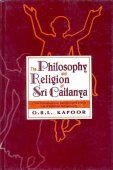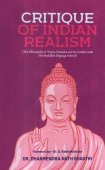Madhva: 10 definitions
Introduction:
Madhva means something in Hinduism, Sanskrit, Marathi. If you want to know the exact meaning, history, etymology or English translation of this term then check out the descriptions on this page. Add your comment or reference to a book if you want to contribute to this summary article.
In Hinduism
Vaishnavism (Vaishava dharma)
Source: Pure Bhakti: Bhagavad-gita (4th edition)Madhva (मध्व) refers to “the chief ācārya of the Brahmā sampradāya who established the doctrine of dvaita-vāda, which emphasizes the eternal distinction between the living entity and the Supreme Lord”. (cf. Glossary page from Śrīmad-Bhagavad-Gītā).

Vaishnava (वैष्णव, vaiṣṇava) or vaishnavism (vaiṣṇavism) represents a tradition of Hinduism worshipping Vishnu as the supreme Lord. Similar to the Shaktism and Shaivism traditions, Vaishnavism also developed as an individual movement, famous for its exposition of the dashavatara (‘ten avatars of Vishnu’).
Languages of India and abroad
Marathi-English dictionary
Source: DDSA: The Molesworth Marathi and English Dictionarymadhva (मध्व).—m (S madhva Proper name of the founder.) A sect, or an individual of it, among the vaiṣṇava Brahmans.
--- OR ---
mādhva (माध्व).—m (S) A follower of madhva the name of the founder of a sect among the vaiṣṇava Brahmans.
Source: DDSA: The Aryabhusan school dictionary, Marathi-Englishmādhva (माध्व).—m A follower of madhva the name of the founder of a sect among the vaiṣṇava brāhmaṇa.
Marathi is an Indo-European language having over 70 million native speakers people in (predominantly) Maharashtra India. Marathi, like many other Indo-Aryan languages, evolved from early forms of Prakrit, which itself is a subset of Sanskrit, one of the most ancient languages of the world.
Sanskrit dictionary
Source: DDSA: The practical Sanskrit-English dictionaryMadhva (मध्व).—Name of a celebrated preceptor and author, the founder of the sect of Vaiṣṇavas, and author of a Bhāṣya on the Vedānta Sūtras.
Derivable forms: madhvaḥ (मध्वः).
--- OR ---
Mādhva (माध्व).—a. (-dhvī f.) Sweet; वदन्ति चाटुकान् मूढा यथा माध्व्या गिरोत्सुकाः (vadanti cāṭukān mūḍhā yathā mādhvyā girotsukāḥ) Bhāgavata 11.5.6.
-dhvaḥ A follower of Madhva.
-dhvī 1 A kind of liquor (made from honey).
2) The creeper called Mādhavī.
3) A kind of date tree (Mar. madhukharjūrī).
Source: Cologne Digital Sanskrit Dictionaries: Cappeller Sanskrit-English DictionaryMadhva (मध्व).—[masculine] [Name] of a man.
Source: Cologne Digital Sanskrit Dictionaries: Aufrecht Catalogus CatalogorumMadhva (मध्व) as mentioned in Aufrecht’s Catalogus Catalogorum:—the civil name of Ānandatīrtha.
Source: Cologne Digital Sanskrit Dictionaries: Monier-Williams Sanskrit-English Dictionary1) Madhva (मध्व):—m. Name of the founder of a sect of Vaiṣṇavas in the south of India (he was a Kanarese Brāhman otherwise called Ānanda-tīrtha, Bhagavat-pāda or Madhu, said to have been born about 1200; his doctrine is commonly called Dvaita, ‘Duality’, in opposition to the A-dvaita, ‘Nonduality’, of the great Vedāntist Śaṃkarācārya, and his sect are called Mādhvas), [Religious Thought and Life in India 130 etc.]
2) Mādhva (माध्व):—m. an adherent of Madhva (See p. 782, col. 3), [Horace H. Wilson]
[Sanskrit to German]
Sanskrit, also spelled संस्कृतम् (saṃskṛtam), is an ancient language of India commonly seen as the grandmother of the Indo-European language family (even English!). Closely allied with Prakrit and Pali, Sanskrit is more exhaustive in both grammar and terms and has the most extensive collection of literature in the world, greatly surpassing its sister-languages Greek and Latin.
Kannada-English dictionary
Source: Alar: Kannada-English corpusMādhva (ಮಾಧ್ವ):—[adjective] of, relating to, adhering to Madhva mata, a dualisticphilosophy established by Madhvācārya, a Vaiṣṇava saint of Karnāṭaka.
--- OR ---
Mādhva (ಮಾಧ್ವ):—[noun] a follower of Mādhva mata, a dualisticphilosophy established by Madhvācārya, a Vaiṣṇava saint of Karnāṭaka.
Kannada is a Dravidian language (as opposed to the Indo-European language family) mainly spoken in the southwestern region of India.
See also (Relevant definitions)
Starts with (+45): Madhvabhashya, Madhvacarya, Madhvacaryavijaya, Madhvacharya, Madhvad, Madhvadhara, Madhvadi, Madhvaga, Madhvaguru, Madhvahnika, Madhvahuti, Madhvajya, Madhvaka, Madhvaksha, Madhvala, Madhvalam, Madhvalopa, Madhvalu, Madhvaluka, Madhvamahatmya.
Ends with: Samadhva.
Full-text (+87): Madhvamata, Madhvacarya, Madhvaguru, Madhvasiddhantasara, Anandatirtha, Madhvavidhvamsana, Madhvamukhamardana, Madhvamukhabhanga, Bodharayacarya, Mattuvar, Mattuvan, Madhavatirtha, Mattuvam, Madhvamatakhandana, Madhvasiddhantabhanjana, Madhvamataprakarana, Madhvamatapradarshana, Madhvamatavidhvamsana, Madhvavedanta, Madhvastuti.
Relevant text
Search found 48 books and stories containing Madhva, Mādhva; (plurals include: Madhvas, Mādhvas). You can also click to the full overview containing English textual excerpts. Below are direct links for the most relevant articles:
Hindu Pluralism (by Elaine M. Fisher)
The Sectarianization of Classical Knowledge Systems < [Chapter 3 - Constructing Sectarian Identities in Early Modern South India]
Hinduism in the Sectarian Age < [Chapter 1 - Hindu Sectarianism: Difference in Unity]
The Many Meanings of Nārāyaṇa < [Chapter 3 - Constructing Sectarian Identities in Early Modern South India]
A History of Indian Philosophy Volume 4 (by Surendranath Dasgupta)
Part 5 - Rāmānuja and Madhva < [Chapter XXV - Madhva and his School]
Part 4 - Madhva’s interpretation of Brahma-sūtra I. 1. 3-4 < [Chapter XXVI - Madhva’s Interpretation of the Brahma-sūtras]
Part 1 - Madhva’s Life < [Chapter XXV - Madhva and his School]
Rig Veda (translation and commentary) (by H. H. Wilson)
A History of Indian Philosophy Volume 3 (by Surendranath Dasgupta)
Part 1 - Teachers and Pupils of the Nimbārka School < [Chapter XXI - The Nimbārka School of Philosophy]
Part 3 - The Precursors of the Viśiṣṭādvaita Philosophy < [Chapter XVIII - An Historical and Literary Survey of the Viśiṣṭādvaita School of Thought]
Chaitanya Bhagavata (by Bhumipati Dāsa)
Verse 2.1.3 < [Chapter 1 - The Beginning of the Lord’s Manifestation and His Instructions on Kṛṣṇa-saṅkīrtana]
Verse 1.9.188 < [Chapter 9 - Nityānanda’s Childhood Pastimes and Travels to Holy Places]
Verse 1.9.154 < [Chapter 9 - Nityānanda’s Childhood Pastimes and Travels to Holy Places]
Sri Krishna-Chaitanya (by Nisikanta Sanyal)
Chapter 8 - Founder-Acharyas (d): Madhva (Madhvacharya or Srimat Purnaprajna) < [Volume I - Introductory]
Chapter 7 - The Founder-Acharyas (Introduction) < [Volume I - Introductory]
Chapter 23 - Initiation (Continued) < [Volume II]
Related products


